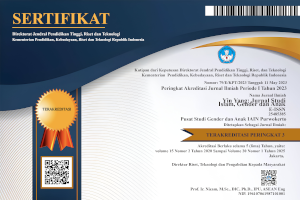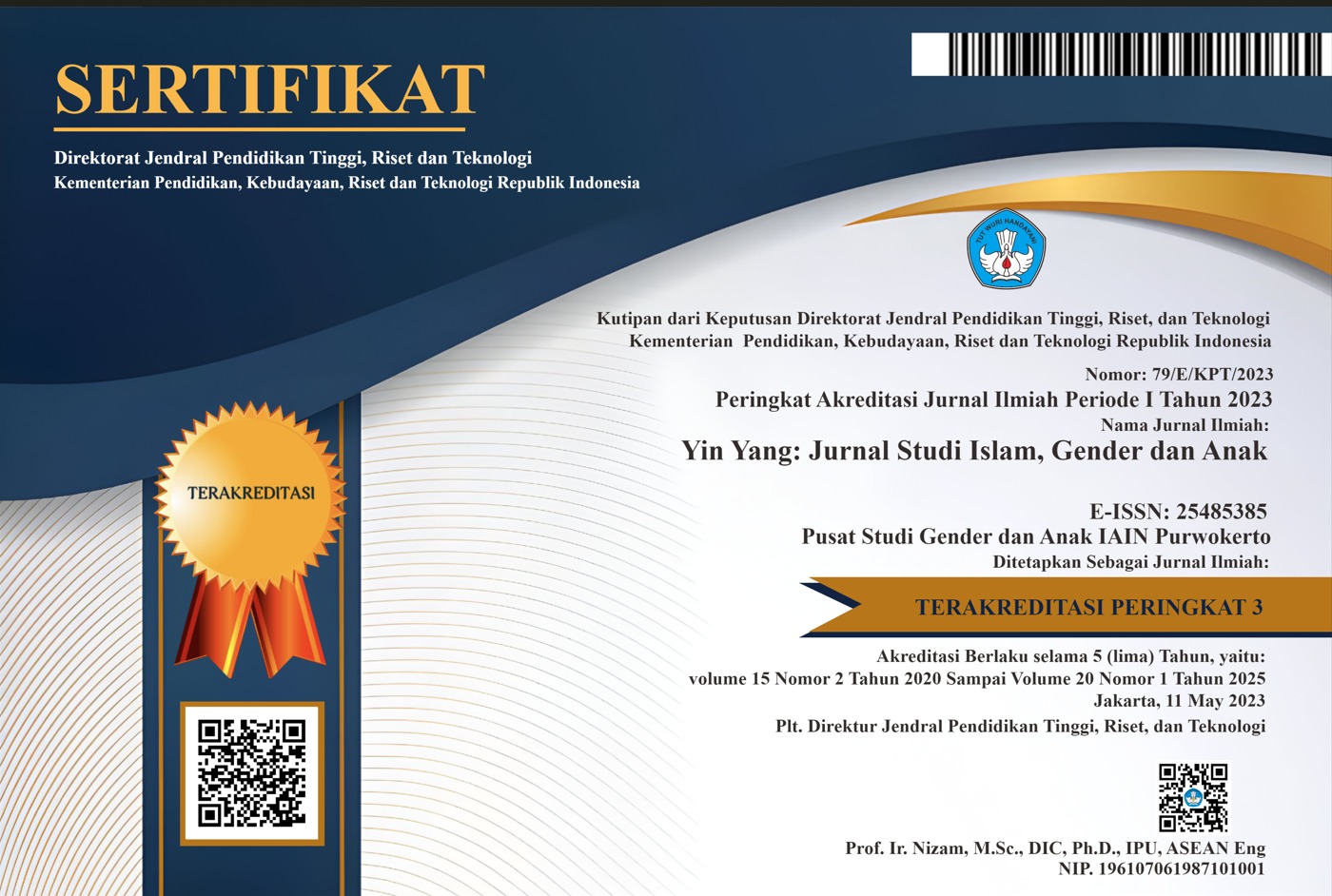Layanan pendidikan pada siswa hiperaktif
studi kasus 2 siswa kelas V MI Ma'arif NU 1 Ajibarang Wetan kecamatan Ajibarang kabupaten Banyumas
DOI:
https://doi.org/10.24090/yinyang.v15i1.3307Keywords:
Hyperactivity, educational servicesAbstract
The success of the education process in a school is influenced by many factors. Factors that come for example from the teacher, students, curriculum, and other social environments. But the most important factor comes from two figures, namely teachers and students, especially in learning activities. In the teaching and learning process, the teacher finds the diversity of individual students whose results can be seen many differences from one student to another student. Seeing the characteristics of each of these students, it is not uncommon for teachers to be exposed to students who have hyperactive behavior. The condition of such children is usually very difficult for teachers to manage and educate them, aside from the fact that they are very difficult to calm down, also because hyperactive children often interfere with other students. Examples of hyperactive student behavior, like to interrupt teachers or friends, difficult to follow the learning, always feel bored, annoying friends and others. Therefore, the learning achievement of hyperactive children is also classified as less than the maximum. The definition of hyperactivity itself is a person's behavior that shows an attitude of not wanting to be quiet, not paying attention and impulsive. But hyperactive children still have the right to gain knowledge. The existence of educational services through formal institutions such as in Madrasah Ibtidaiyah, the efforts obtained include: teacher strategies and methods in the learning process, creativity development, talent development activities, the use of attractive media, rewards and punishment.Downloads
Download data is not yet available.
References
A. Dayu P. (2013). Mendidik Anak ADHD Hal-hal Yang Tidak Bisa Dilakukan Obat. Yogyakarta: Javalitera.
A. Supratiknya. (1995). Tinjauan Psikologi Komunikasi Antar Pribadi. Yogyakarta: Kanisius (Anggota IKAPI).
Aldjon Dapa. (2007). Manajemen Pendidikan Inklusif. Jakarta: Dirjen DIKTI Departemen Pendidikan Nasional.
Binti Maunah. (2009). Ilmu Pendidikan. Yogyakarta: Penerbit Teras.
Chalidah, Ellah Siti. (2005). Terapi Permainan Bagi Anak yang Memeerlukan Layanan Pendidikan Khusus. Jakarta: Dirjen DIKTI Departemen Pendidikan Nasional
Grant, Martin. (1998). Terapi Untuk Anak ADHD. Jakarta: PT Bhuana Ilmu Populer.
Isna F. Perdana. (2012). Lebih Paham dan Dekat dengan Anak ADD dan ADHD. Yogyakarta: Familia
Kewley. Geoff dan Latham, Pauline. (2010). 100 Ide Membimbing Anak ADHD. Jakarta: Esensi.
Mangunsong, Frieda. (2011). Psikologi dan Pendidikan Anak Bekebutuhan Khusus. Depok: LPSP3 Universitas Indonesia.
Marlina. 2007. Asasmen dan Strategi Intervensi Anak ADHD. Jakarta: Dirjen DIKTI Departemen Pendidikan Nasional.
Martin, L. Grant. 2008. Terapi Untuk Anak ADHD, Anak Hiperaktif, Sulit Konsentrasi, Tidak Aktif, Kurang Perhatian dll. Jakarta: Bhuana Ilmu Populer.
Smith, J. David. (2009). Inklusi, Sekolah Ramah untuk Semua. Bandung: Nuansa.
Sugiarmin, Mohamad. (2007). ADHD. Bandung: Bahan Ajar.
Suparno. (2008). Pendidikan Anak Berkebutuhan Khusus (Bahan Ajar Cetak). Jakarta: Dirjen DIKTI Departemen Pendidikan Nasional.
Taylor, Eric. (1988). Anak yang Hiperaktif Tuntunan bagi Orang Tua. Jakarta: Gramedia.
Tin Suharmini. (2005). Penangangan Anak Hiperaktif. Jakarta: Depdiknas DirjenP2TK2.
Zaviera, Ferdinand. (2012). Anak Hiperaktif: Cara Cerdas Menghadapi Anak Hiperaktif dan Gangguan Konsentrasi. Yogyakarta: Kata Hati.
Zaviera, Ferdinand. (2014). Anak Hiperaktif. Yogyakarta: Kata Hati.
A. Supratiknya. (1995). Tinjauan Psikologi Komunikasi Antar Pribadi. Yogyakarta: Kanisius (Anggota IKAPI).
Aldjon Dapa. (2007). Manajemen Pendidikan Inklusif. Jakarta: Dirjen DIKTI Departemen Pendidikan Nasional.
Binti Maunah. (2009). Ilmu Pendidikan. Yogyakarta: Penerbit Teras.
Chalidah, Ellah Siti. (2005). Terapi Permainan Bagi Anak yang Memeerlukan Layanan Pendidikan Khusus. Jakarta: Dirjen DIKTI Departemen Pendidikan Nasional
Grant, Martin. (1998). Terapi Untuk Anak ADHD. Jakarta: PT Bhuana Ilmu Populer.
Isna F. Perdana. (2012). Lebih Paham dan Dekat dengan Anak ADD dan ADHD. Yogyakarta: Familia
Kewley. Geoff dan Latham, Pauline. (2010). 100 Ide Membimbing Anak ADHD. Jakarta: Esensi.
Mangunsong, Frieda. (2011). Psikologi dan Pendidikan Anak Bekebutuhan Khusus. Depok: LPSP3 Universitas Indonesia.
Marlina. 2007. Asasmen dan Strategi Intervensi Anak ADHD. Jakarta: Dirjen DIKTI Departemen Pendidikan Nasional.
Martin, L. Grant. 2008. Terapi Untuk Anak ADHD, Anak Hiperaktif, Sulit Konsentrasi, Tidak Aktif, Kurang Perhatian dll. Jakarta: Bhuana Ilmu Populer.
Smith, J. David. (2009). Inklusi, Sekolah Ramah untuk Semua. Bandung: Nuansa.
Sugiarmin, Mohamad. (2007). ADHD. Bandung: Bahan Ajar.
Suparno. (2008). Pendidikan Anak Berkebutuhan Khusus (Bahan Ajar Cetak). Jakarta: Dirjen DIKTI Departemen Pendidikan Nasional.
Taylor, Eric. (1988). Anak yang Hiperaktif Tuntunan bagi Orang Tua. Jakarta: Gramedia.
Tin Suharmini. (2005). Penangangan Anak Hiperaktif. Jakarta: Depdiknas DirjenP2TK2.
Zaviera, Ferdinand. (2012). Anak Hiperaktif: Cara Cerdas Menghadapi Anak Hiperaktif dan Gangguan Konsentrasi. Yogyakarta: Kata Hati.
Zaviera, Ferdinand. (2014). Anak Hiperaktif. Yogyakarta: Kata Hati.
Downloads
Published
2020-05-13
How to Cite
Aprilia, R. R. (2020). Layanan pendidikan pada siswa hiperaktif: studi kasus 2 siswa kelas V MI Ma’arif NU 1 Ajibarang Wetan kecamatan Ajibarang kabupaten Banyumas. Yinyang: Jurnal Studi Islam Gender Dan Anak, 15(1), 127–146. https://doi.org/10.24090/yinyang.v15i1.3307
Issue
Section
Articles
License
Authors who publish with this journal agree to the following terms: Authors retain copyright and grant the journal right of first publication with the work simultaneously licensed under a Creative Commons Attribution-ShareAlike 4.0 International License that allows others to share the work with an acknowledgment of the work's authorship and initial publication in this journal.


















